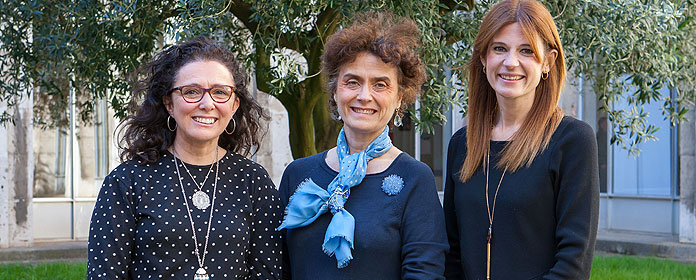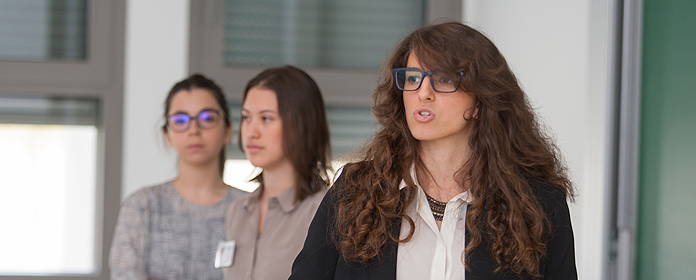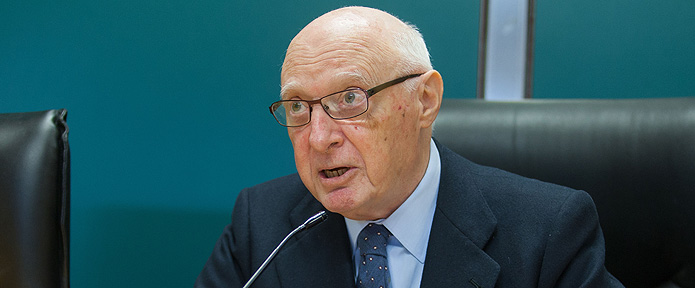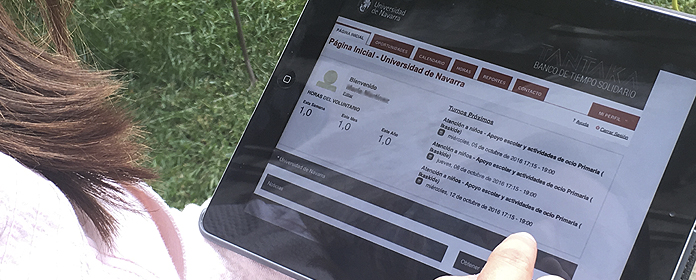"The wage gap is largely linked to the greater weight of partial work among women and this, to the fact of being a mother."
Researcher Dolores López presents at the University the study "Women in Navarra and gender indicators".

"The wage gap is linked to a large extent to the greater weight of partial work among women and this to the fact of being a mother". So says the researcher Dolores López, professor of Human Geography at the University of Navarra and author of the study "Women in Navarra and gender indicators. Conceptual and methodological analysis", presented on the occasion of International Women's Day.
The work, which will be published in the next issue of the journal Príncipe de Viana, carries out an analysis of the status of women in the region based on the gender indicators developed by the high school de Estadística de Navarra ((Na)Stat). The researcher values this methodology, since it allows "to have a global vision of the gender perspective by means of a specific and intuitive indicator that compares in a simple way, the differences between men and women, in different areas: population, health, Education, work, justice, living conditions, leisure and sports, and information technologies", she explains.
According to the author, with the data collected in these gender indicators, situations of greater female vulnerability can be seen in political under-representation and in situations related to labor activity, such as the fees unemployment or the wage gap, and also situations of greater male vulnerability in mortality levels. At the same time, transformations are reflected that tend to homogeneity processes such as "the consumption of alcohol and tobacco or the use of new technologies, and even situations where women have surpassed men as in the feminization of the university student body ", he stresses.
Having good statistics to make vulnerable situations visibleThe complexity, says Dolores López, is especially pronounced in the case of the wage gap. "In many cases it is the personal choices associated with having children or caring for elderly parents that penalize women," she points out. With the overall data, in her opinion, wage differences are appreciated but not necessarily discrimination. "Is working full-time or part-time the result of a free choice or not?" she asks. "In addition to comparing equal or very similar work situations, we must take into account the personal choices that lead, especially women, to opt for a reduced workshop ," she says.
The data of the survey Social and Living Conditions of the high school of Statistics of Navarre show that in 2017, 3 out of 10 working women in Navarre do so part-time (compared to 1 out of 10 males). "When we compare the reasons between males and females we see that family is the main reason (41.3%), followed by not finding work full-time (28%). In the case of men, the reason most frequently mentioned is not finding work full-time ", she explains. However, in his opinion, further work is needed to have a statistical system with a greater level of detail that includes not only the male/female variable but also other characteristics such as disability. "Having statistical data with a good level of disaggregation allows us to make women and their situations of vulnerability more visible and, in this way, to look for solutions," says the author.
Add the "home" perspectiveIn addition to including preferences, Professor Dolores López proposes improving the statistics by adding more of a "household" perspective. For example, "information on unemployment fees for men and women provides individual information, but knowing the issue of households where both parents are unemployed or single-parent households where the mother is unemployed, for example, provides information closer to everyday scenarios".
Along the same lines, the professor stresses the need to "broaden the view of equality to include not only public spaces but also intra-family life and the search for harmony between work, family and life staff". It also proposes that the programs of study of conciliation incorporate men to a greater extent. "There must be a co-responsibility of family responsibilities so that the incorporation of women into the labor market takes place in parallel with the incorporation of men into household tasks".
The author of the study, which was presented at the congress of the Society of Historical programs of study of Navarra, is committed to contextualizing the reality of women with a global view, in space and time: "It is possible to congratulate ourselves for the achievements in subject of equality without ceasing to be self-critical so that these can be consolidated and extended. The prevailing discursive narratives are feeding confrontational discourses and it is necessary to articulate spaces for dialogue and analysis based on evidence and on data.
Rereading history at core topic female: the contributions of women from Navarre.The study "Women in Navarra and gender indicators" is part of the programs of study on women of the group GENOVIFEM of the University of Navarra. Mª Cruz Díaz de Terán, coordinator of the research line of this group, stresses the need "to reread history in core topic feminine, giving back to women the real protagonism they have had in the different scientific fields". On this path, she points out, "the recognition of the contributions of the women of Navarra is an essential step forward in order to know the complete history of the region".
For her part, Mercedes Jover, board member of the board of the Sociedad de programs of study Históricos de Navarra, expressed her satisfaction for collaborating with this line of research that highlights "the other half of history", through great and small names of women.




